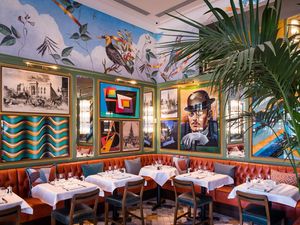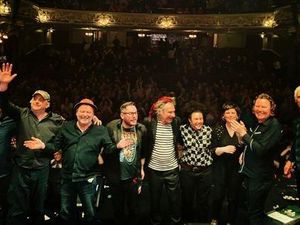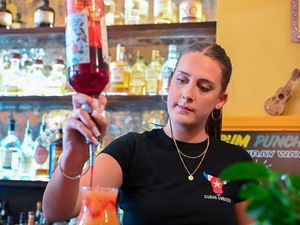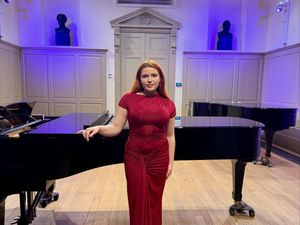Paul Young talks ahead of Birmingham, Shrewsbury and Coventry shows - interview
Even after 30 years in pop, retirement is the last thing on Paul Young's mind. Here he talks throwback tours, Live Aid and supermodel Cindy...
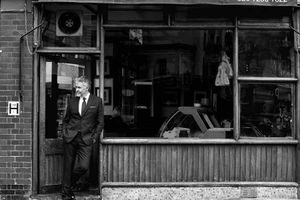
There are no regrets. After winning a couple of Brit Awards, playing Wembley Stadium too many times to remember and filling his house with seven platinum discs and one gold, Paul Young's reasonably happy with the way things have gone.
It would have been a good idea to write a few more tunes, particularly during his heyday, from 1983 to 1990: that would have given him a comfortable pension fund. But apart from that, he's got little to grumble about.
At an age when most are slowing down, he's still regularly on the road doing what he loves most: playing live.
See Paul's video for Love of The Common People here:
In spring, he'll return to the West Midlands to headline Shrewsbury's Theatre Severn on March 7 and Birmingham Town Hall on March 12. The gig is part of an 80s Invasion Tour, in which he'll line up alongside Martika, Toyah and China Crisis. It'll be the usual format: play the tunes, hit the bar, thank you very much ladies and gentlemen.
He's reconciled himself to the shows, having once resisted on the grounds that they were naff.
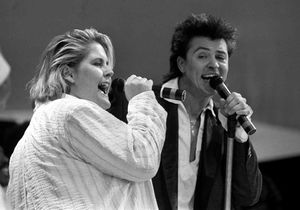
"They are good fun to do. I said no at first because I didn't want to be stuck in the 80s. I was recording current albums and didn't just want to be known for that era. I had four or five hits in the 90s, too. But then I thought, you know, who gives a s**t. I figured I was celebrating the fact I've had success and I changed my view. After that, I started to really enjoy them."
Paul likens the tour to the sort of roadshows that were commonplace during the 1960s, when American bands and up-and-coming British bands would join forces. "They all did them. You'd get a bill with The Stones, Small Faces, Chubby Checker and a couple of rising stars. I like to think our shows are like that."
His audience has changed down the years. The kids of those who grew up listening to his quadruple platinum No Parlez now bring their own kids – and in some cases, their grandkids. Paul, however, isn't wedded to that record, which made him a household name. Nor does he fixate on The Secret Of Association, a double-platinum number one that was a hit around the world, including in America. He loves those records as much as two similar hits; Between Two Fires and Other Voices. But he's equally proud of later works, including the 2006 record Rock Swings and this year's new album, Good Thing, which was in the charts with a bullet, at, uhm, 87.
"Look, it's nice to be able to make new music but I've always enjoyed the live side of it more. There's nothing like getting up on stage. But the new album did well and having good reviews means I can go back on the road."
Craft
He was ready for stardom when No Parlez broke. The record sold more than a million copies and spawned the hits Iron Out The Rough Spots, Love of the Common People and Wherever I Lay My Hat (That's My Home), as well as Come Back And Stay. It was the second best-selling album of 1983, behind Michael Jackson's Thriller, which achieved worldwide sales of 65 million and became the first ever to be certified 32-times platinum. Paul's record was more successful than albums by Culture Club, David Bowie, WHAM!, Spandau Ballet, Genesis, Lionel Richie, The Police, UB40, Eurythmics, Elton John, The Jam, and Duran Duran, among others.
He took it in his stride. "I was a lot more ready for it than the artists are now. I'd had six years of driving up and down the M1 before it happened, gigging in clubs and learning my craft."

Though he didn't expect his record would stay on the chart for 119 weeks, he was banking on success. "Yes, that's what we were all hoping would happen. When it happened, I was ready for it. I wasn't ready for the magnitude, perhaps, and going round the world was a shock. When we released it, I was just thinking about success in the UK. But it went quadruple platinum within a few years and it's probably quintuple by now."
The biggest change was in his bank balance. Paul was no longer scraping together money for petrol. And he could afford to stay in hotels rather than kip in the back of the van after a gig.
"The biggest difference was not being skint anymore, that's what I noticed. In many ways, it was just like it had been before but the speed was breakneck and it was more intense.
"I'd always toured, so that didn't change. I remember the first tour I did we tried to keep our costs down so we stayed in a transit van rather than in a hotel. The fans realised we were in there after a gig one time and they nearly rocked it over, so after that, we had to get a bigger bus.
"That was around the time of Where I Lay My Hat. I was on tour to promote that and we'd booked ourselves into large clubs/small theatres. When it went to number one, my manager said: 'We either cancel the gigs and resell in a bigger venue or we honour the shows'. He asked me what I wanted to do and I told him we should honour the shows. The people running a smaller venues were trying to make a living so I was a big draw for them. We had to be faithful to the cause.
"The tour ran at a loss." Imagine that. Paul was the UK's biggest star – and when you factor in global stars, he was second only to Michael Jackson. Yet he was still kipping in the back of a transit, hustling promoters for his wages and running at a loss.
As No Parlez embedded itself in the nation's conscious, that soon changed. He became an international star, enjoying a number one in Switzerland, Sweden, Northern Ireland and Germany. The record also made the top five in Austria, New Zealand and Norway while the UK finally woke up and propelled him into the Billboard Top 100.
For two years, he was seldom home. As touring commitments became the norm, he was sent around the world time and time again to promote the record and cash-in.
"I think the biggest thing I didn't see coming was how much I'd enjoy the travel. Going to different places was great. Seeing and eating amazing things was great. Now that the years have gone by, I don't fly business or first class all the time. But when the little perks like that come along from time to time, you really appreciate them."
Time has been kind to him and he's grateful for his lot. While many of his contemporaries are all washed up, Paul still makes a decent living by singing his favourite tunes. "It's not just that," he says. "In general, everybody's really nice to me. And it's nice to know I was a part of people's lives. People got married to my music, they celebrated anniversaries, those songs became really important. OK, they might not have been married to Everytime You Go Away or Wherever I Lay My Hat – that would have been wrong – but they were important. Besides, both of those tunes are big songs in the forces, particularly Everytime. They mean a lot to people and that's really special."
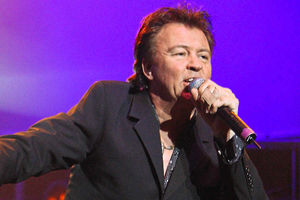
Paul enjoyed success in the States. His 1985 album, The Secret Of Association, was a top 20 hit, while also hitting number one in the UK. As well as Everytime, a USA number one and UK number four, it featured the hit I'm Gonna Tear Your Playhouse Down.
"Getting out to the States was great. I grew up on American music. That inspired me for years. I liked a lot of English bands too but they were influenced by the early American bands. So going there was a big thing.
"I went back under my own steam and drove from the East coast to the West coast, riding through the desert. That was an incredible thing. I fell in love with parts of the USA, with the food and the music. When my kids were really young, I'd hire an RV, a nice big touring bus. We'd just go down to Texas and drive around there and through New Mexico. Then we'd carry on down into Mexico and just soak it all up. We did the most amazing things. We saw Monument Valley, Hoover Dam and rode horses in the Grand Canyon."
For a while, he had mixed feelings about his biggest hits. Everytime and Wherever I Lay My Hat went beyond anything he could have imagined – and, understandably, he grew sick of singing them every damn night.
He laughs at that thought now. "It's true, I'd go off them for a while. As a performer, you need to keep things fresh so I'd want to do things differently and change the arrangements to keep it interesting for me. But then, after a while, I'd run out of ideas and I'd have to strip it back to the original. I'd get bored and change it. Then I'd get fed up of the changes. That's what happens, you fall in and out of love with them."
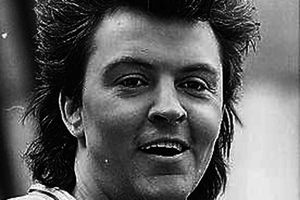
He played at some of the most momentous gigs of his era, lining up at Live Aid, the Freddie Mercury tribute and performing the National Anthem before England's Euro '96 semi final against Germany.
"Live Aid was one of those things. It was incredible. Looking back, I wish I could remember the whole day because I can only remember little snippets. There was so much going on. I get mixed up with that and the Freddie Mercury Tribute concert because they were both massive events. I remember being interviewed by Cindy Crawford, that was a big plus point.
"The Wembley gigs were probably the ones I enjoyed the most. I lived quite close and I could be home 15 minutes after the gig so it was like playing in my own back yard. When I played Wembley, I felt like I was among friends. It was special to me, it was like me and the people in the audience knew each other. I've had great shows around the world, but home town gigs were always the best."
And when the success stopped, as it inevitably does, Paul kept touring. Obscurity knocked but he didn't answer the call. He kept working, staying on the road.
"That's the thing. The people that look at you at a pop star forget that in fact you're a working musician. When I left CBS Records and found myself with nothing to do, instead of resting or doing something unrelated to music, I formed another band. Music is my everything, really. I listen to music in the car all the time. I like driving to gigs, I have the iPod on. It's not 80s stuff, it's soul, punk, rock, Latin American and hip hop. On my iPod, I used to upload little quotes from movies. So it would spin through a playlist and suddenly some Johnny Depp dialogue would come up from Ace Ventura or Pirates of the Caribbean."
It's time to hit the road and Paul cranks up his iPod as he sets off for tonight's gig. Home is where the heart is. It's wherever he lays his hat. . .
The 80s Invasion Tour is taking place at Birmingham's Town Hall on March 12, at 7.30pm. Tickets cost from £37. Visit www.thsh.co.uk or call 0121 780 3333.
He will also be performing at Step Back! at Coventry's Ricoh Arena on October 14, alongside the likes of Cutting Crew and Tony Hadley.
By Andy Richardson

